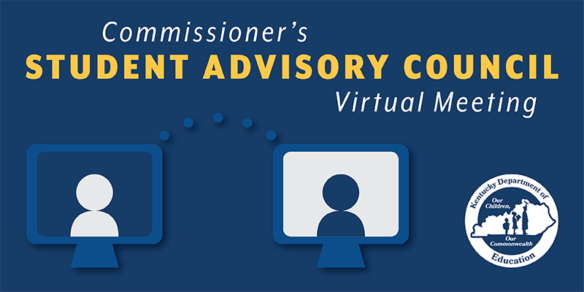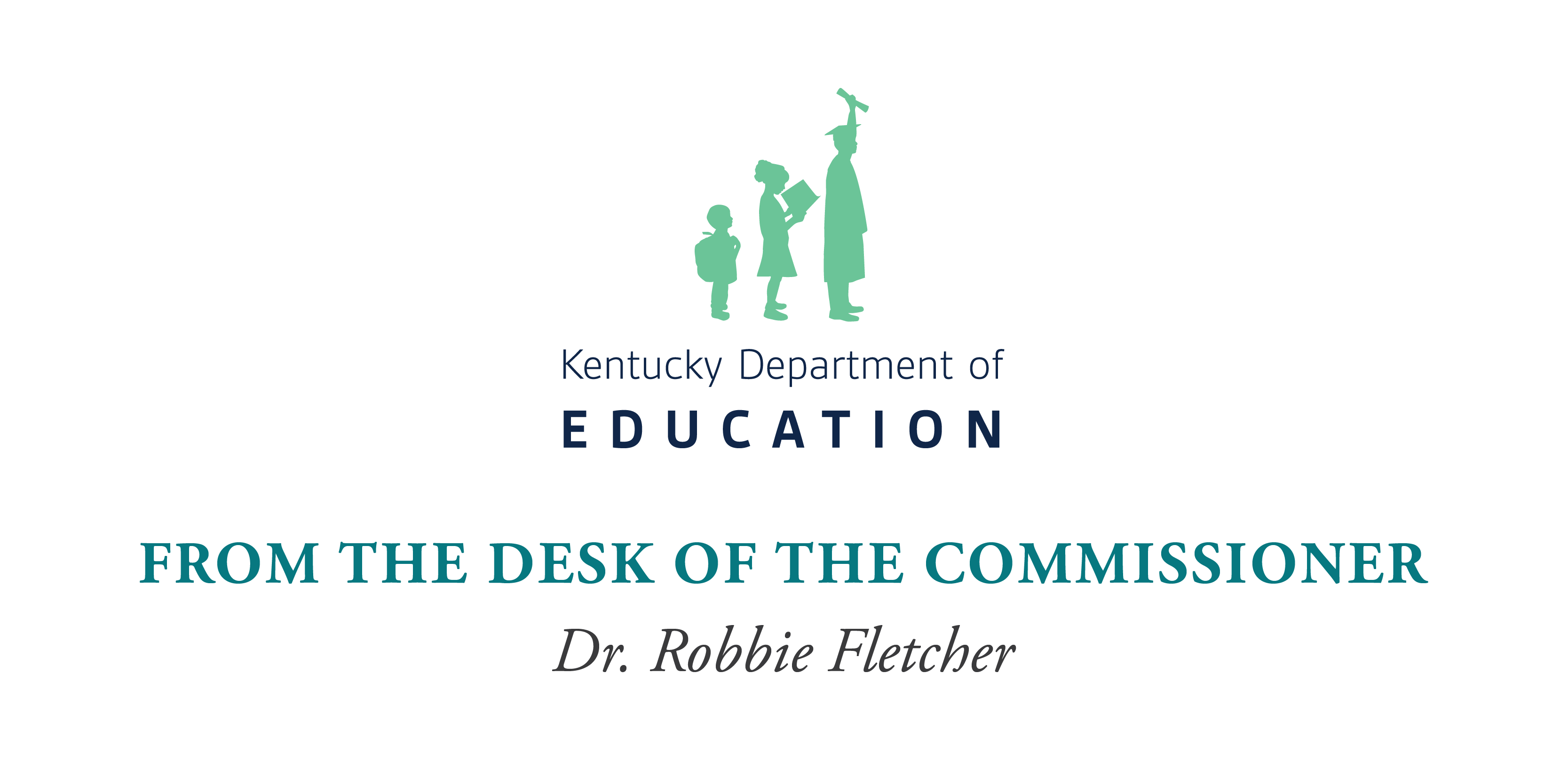
- Amanda Ellis, associate commissioner of KDE’s Office of Teaching and Learning, spoke with the council about how the graduation requirements could be adjusted for seniors as a response to COVD-19.
- Damien Sweeney, KDE’s program coordinator for comprehensive school counseling, spoke with students about mental health and how they are handling NTI instruction.
By Jacob Perkins
Jacob.perkins@education.ky.gov
The Kentucky Department of Education’s (KDE) Commissioner’s Student Advisory Council met virtually March 25 to discuss the impact COVID-19 is having on public school students in the Commonwealth.
“As schools across Kentucky navigate uncharted waters with this crisis, I am particularly interested in hearing from you, as you are directly affected by these changes,” Interim Commissioner Kevin C. Brown told the students. “Your voice is incredibly important – your questions, concerns and comments will help guide us as we move forward.”
Amanda Ellis, associate commissioner of KDE’s Office of Teaching and Learning, spoke with the council about how Kentucky’s minimum graduation requirements could be adjusted for seniors as a response to the school closures caused by COVD-19.
“One of our concerns that we have across the state is all of the seniors having the opportunity to fulfill their graduation requirements,” Ellis said.
When looking at Kentucky’s minimum high school graduation requirements, it’s important to focus on the “minimum” aspect. Minimum high school graduation requirements may be strengthened by individual districts to fit the needs of their students, she said.
“Some of you all may have to be transition ready. Some of you all may either have to have an industry credential or meet ACT benchmarks. Some may have to do a certain number of work service hours,” Ellis said. “These are local decisions, but now we’re in a little bit of a different time.”
Brown told students that due to COVID-19, KDE will be working to ensure that seniors are not penalized for meeting just the state’s minimum graduation requirements.
Currently, seniors are required to have a minimum of 22 credit hours. Local districts can add on to that number to fit the needs of their students. However, KDE is considering asking districts to waive these additional hours so that their seniors – as long as they have met the required 22 credit hours – will be able to graduate high school.
Another option would be for KDE to go to the Kentucky Board of Education (KBE) and ask them to waive the regulatory requirement for electives. Seniors are required by law to have seven elective credit hours. Under this option, seniors could graduate with a minimum of 15 total credit hours.
After discussing this with the Student Advisory Council, the next step is for KDE to take the student feedback to KDE’s Education Continuation Task Force at its March 30 meeting.
Because it is a statutory requirement, KDE also is asking the Kentucky General Assembly for a waiver of the civics test requirement for seniors.
“We have requested that this requirement be waived,” Ellis said. “This is another thing that we do not want prohibiting seniors from graduating.”
At its March 18 meeting, the KBE approved waivers that allowed all 172 Kentucky school districts join the Non-Traditional Instruction (NTI) Program, which allows education to continue even if school buildings are closed.

Interim Education Commissioner Kevin C. Brown, bottom left, met virtually with the Commissioner’s Student Advisory Council. The council came together to discuss the impact COVID-19 is having on public school students in the Commonwealth.
KDE officials reached out to the Student Advisory Council for feedback on their experiences so far in the NTI Program.
C.J. Johnson, a senior from Marshall County High School, praised how his district has handled the switch to digital learning.
“Our NTI is going really well. I’m not losing any instruction in my classes and I’m actually learning more about first-world issues,” he said.
Luke Wyatt, another Marshall County High School senior on the council, said he has found that teachers are more available using NTI to explain the classwork.
“Sometimes in class, you can go and get that extra help. But with NTI, you can have an hour of just one-on-one time,” Wyatt said.
The students did express that they are finding Advanced Placement (AP) classes to be overwhelming at times through NTI.
“My school is doing a pretty good job about getting the NTI instruction,” said Lauren Witt, a senior from Glasgow High School (Glasgow Independent). “The only negative aspect is for students taking a lot of AP classes. The course load can be kind of overwhelming.”
Damien Sweeney, KDE’s program coordinator for comprehensive school counseling, spoke with students about mental health and how they are handling NTI instruction.
“Social and emotional learning is going to be more important at this unusual time than any core content,” he said. “We have to make sure that kids can connect to other people, even with social distancing.”
The students on the council said that they are experiencing some stress and anxiety due to the affect COVID-19 has had on their schools.
“I think especially with seniors, it’s been really hard because we’ve been waiting 12 years to participate in senior activities and the thought of all of that potentially not happening does make us anxious and stressed,” said Witt.
The council said that students throughout the Commonwealth are trying to stay in touch with one another through social media, texts and phone calls, but they admit that this is tough to do while social distancing.
“A big thing that a lot of kids have really been experiencing is the loneliness factor,” said Joshua Griffith, a senior from Russell High School (Russell Independent). “A lot of their parents go and work during the day, so they just sit at home all day because they can’t go out anywhere. After about two weeks of that, it starts to mess with people.”
Some of the ways that the students on the council recommend educators and/or counselors can keep the spirits of their students up are through Zoom meetings or even having a spirit week while at home.
“KDE is really working with counselors and educators to provide those virtual sessions with students,” Sweeney said. “We realize that connecting is extremely important.”
The purpose of the Commissioner’s Student Advisory Council is to provide valuable feedback from Kentucky students and to engage student leaders in learning by doing. This group meets with the commissioner and KDE staff to discuss how decisions made at the state level are affecting public school students throughout Kentucky and provide feedback – from a student perspective – on critical issues impacting Kentucky students and schools.
The next Commissioner’s Student Advisory Council meeting is scheduled for April 14 unless guidance and feedback is needed by KDE before then due to the evolving nature of the COVID-19 crisis.
For more information about COVID-19:
- Kentucky Department for Public Health’s COVID-10 webpage
- KDE’s 2019 COVID-19 webpage
- COVID-19 Hotline (800) 722-5725




For the past two weeks, I have increased my workload to about 14 hours a day, plus weekends. I have had to recreate many of the items in my classroom and agenda into digital form. A letter video I could call up and quickly display, now has to be copied, pasted, and scheduled in my google classroom. I’ve had to take photos of my class calendar and various daily charts for each day we are out, so that my kids can have familiar routines and visuals. I can’t just open a set of reading books and read with a group of kids; I have to take photos of each page, organize them into a slideshow, schedule a meeting with families, teach parents to download and use the technology, then reschedule with those who couldn’t join the meeting for whatever reason. This is VERY time-consuming, but necessary for my kids to continue to progress during this hiatus. I’m not complaining, I just want people (including lawmakers) to know what many teachers are doing for their kids.